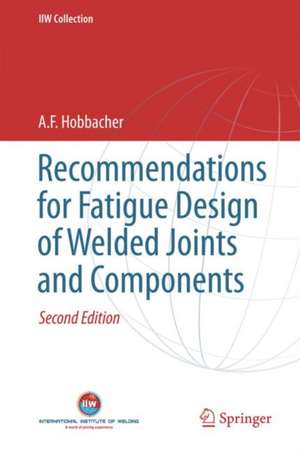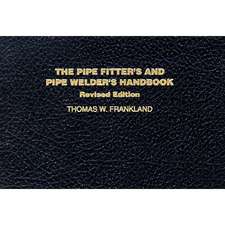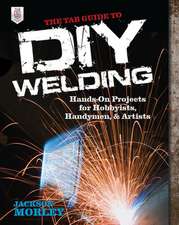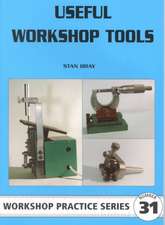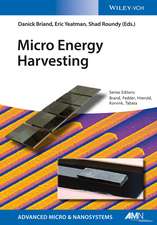Recommendations for Fatigue Design of Welded Joints and Components: IIW Collection
Autor A. F. Hobbacheren Limba Engleză Paperback – 30 mar 2018
| Toate formatele și edițiile | Preț | Express |
|---|---|---|
| Paperback (1) | 634.00 lei 43-57 zile | |
| Springer International Publishing – 30 mar 2018 | 634.00 lei 43-57 zile | |
| Hardback (1) | 763.01 lei 22-36 zile | +19.05 lei 6-12 zile |
| Springer International Publishing – 6 ian 2016 | 763.01 lei 22-36 zile | +19.05 lei 6-12 zile |
Preț: 634.00 lei
Preț vechi: 745.88 lei
-15% Nou
Puncte Express: 951
Preț estimativ în valută:
121.31€ • 127.00$ • 100.38£
121.31€ • 127.00$ • 100.38£
Carte tipărită la comandă
Livrare economică 07-21 aprilie
Preluare comenzi: 021 569.72.76
Specificații
ISBN-13: 9783319795300
ISBN-10: 3319795309
Ilustrații: XVI, 143 p. 166 illus., 13 illus. in color.
Dimensiuni: 155 x 235 mm
Greutate: 0.24 kg
Ediția:Softcover reprint of the original 2nd ed. 2016
Editura: Springer International Publishing
Colecția Springer
Seria IIW Collection
Locul publicării:Cham, Switzerland
ISBN-10: 3319795309
Ilustrații: XVI, 143 p. 166 illus., 13 illus. in color.
Dimensiuni: 155 x 235 mm
Greutate: 0.24 kg
Ediția:Softcover reprint of the original 2nd ed. 2016
Editura: Springer International Publishing
Colecția Springer
Seria IIW Collection
Locul publicării:Cham, Switzerland
Cuprins
General.- Fatigue Actions (Loading).- Fatigue Resistance.- Fatigue Assessment.- Safety Considerations.- Appendices.
Recenzii
“It provides the basis for the design and analysis of welded components that are subjected to fluctuating forces to avoid failure by fatigue. … The book is highly recommended to students in the upper semesters and scientists who are confronted with fatigue loading and design of welded structures during the early stages of their career. In particular, for engineers in their professional practice, the book offers a valuable compilation and overview of recommendations and design codes.” (Prof. Dr.-Ing. Thomas Böllinghaus, Materials Testing, Vol. 58 (5), 2016)
Notă biografică
Prof. Hobbacher studied mechanical engineering at the Technical University in Stuttgart, Germany. He started his career in industry in chemical plant equipment, heavy machinery and pressure vessels, finally as head of the design office. Later he finalized his doctorate thesis at the Aachen Institute of Technology in aerospace engineering. In 1980 he became full professor at the University of Applied Sciences in Wilhelmshaven, Germany, lecturing welding technology, structural steelwork, pressure vessels and pipes. Here, he established the new Institute for Materials and Production Technology, of which he became the first director. He is chairman of the German Welding Society (DVS) working group on design and analysis, and for a period of ten years he was chairman of the International Institute of Welding (IIW) Commission XV on Design and Analysis of Welded Structures. He served as chairman of an IIW Working Group, which developed the IIW Fatigue Design Recommendations. His scientific work resulted into numerous publications, documents and books. For his efforts and achievements he was rewarded with the “Evgeny Paton Prize” in 2013.
Textul de pe ultima copertă
This book provides a basis for the design and analysis of welded components that are subjected to fluctuating forces, to avoid failure by fatigue. It is also a valuable resource for those on boards or commissions who are establishing fatigue design codes. For maximum benefit, readers should already have a working knowledge of the basics of fatigue and fracture mechanics. The purpose of designing a structure taking into consideration the limit state for fatigue damage is to ensure that the performance is satisfactory during the design life and that the survival probability is acceptable. The latter is achieved by the use of appropriate partial safety factors. This document has been prepared as the result of an initiative by Commissions XIII and XV of the International Institute of Welding (IIW).
Caracteristici
Provides a basis for the design and analysis of welded components subject to fluctuating load forces Features best practices for producing welds that avoid fatigue failure Suggests guidelines for boards or commissions responsible for establishing fatigue design codes Includes supplementary material: sn.pub/extras
